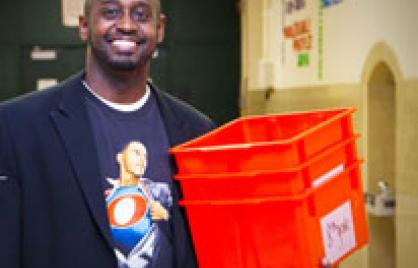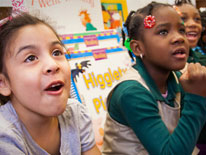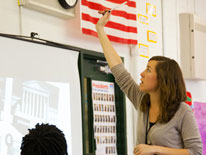
Principal Andre Samuels is cheerily walking down the hall carrying classroom supplies and sporting a President Obama t-shirt in celebration of Black History Month. Principal Samuels proudly tells us that students are also honoring their heroes of the Month by dressing like Dr. Martin Luther King Jr. and Malcolm X, among others. He goes on to talk about what makes him even more proud. He says that half of the students in Read 180 (a program to support struggling readers) already exceeded their yearly goals at the midpoint of the school year. In addition, four students who had previously been in a similar intervention program just moved up into an advanced program, Junior Great Books.
Hugh M. Browne Education Campus is shaping minds from the very youngest to those on the edge of adolescence. With a focus on constantly challenging its students, Browne is seeking to become recognized as an International Baccalaureate (a rigorous, internationally recognized academic program; also known as IB) World school by the 2015-16 school year. In preparation, Principal Samuels and his staff are pushing their students to be self-aware and think critically. The evidence is written on the wall, literally. The halls are lined with essays, papers, and projects dissecting books and chronicling expectations, hopes, and dreams. Parents are also being prepared—the school offers information sessions on International Baccalaureate before community events.
Here’s our conversation with Principal Samuels.
A school for the community
We’re more than just a school; we’re a community center. We are here to be the change agent in this community. And we are creating the change through academics, extracurriculars and pride. We’re here to change the minds of the students, so that they can change minds at home, and in turn, change minds in the community.
We’re also incorporating academics into community events. We don’t want parents to be on the sidelines. We want them to advocate for the students and the students to advocate for themselves.
So as an example, here’s what we’ll do. Thirty minutes before a community food distribution, we’ll share information with parents about Junior Great Books or the Schoolwide Enrichment Model (curriculum to develop advanced learners and provide enrichment to all levels) or International Baccalaureate. We would like our high performing and struggling students alike to encounter challenging texts and material, to at least be exposed to them. And we let the parents know that.
After one event, I overheard a conversation between two parents. One had attended the food distribution, one hadn’t. The parent who attended was sharing with the other parent about what she learned during the IB session before the distribution. It’s during those moments that you know you’re making a difference. It’s what keeps my staff going. I know the families that walk out of here are not just walking out with food, but with books, with knowledge.
Getting kicked out of Sunday school
I was never told, ‘You can do it!’ I got kicked out of elementary school and Sunday school. Sunday school--who gets kicked out of Sunday school? I was the kid who struggled. I never received positive feedback or encouragement; come to think of it, I never received any kind of feedback. I was on my own.
I got tired of believing that I was subpar. My parents didn’t go to college, my four siblings didn’t go to college, and I didn’t want to make the same choices that I saw others making in my community. To do that, I had to change. So I started working hard and paying attention and raising my own expectations.
Good leaders make good leaders
In some ways, I stumbled upon my career in education. I did it the grassroots way. I considered getting a law school degree, but an experience in my community changed all of that. I was a paralegal at a law firm and we had just had a luncheon. I was going to drop-off the leftover food at a local community center. But it was closed. I found out the center had closed due to poor leadership. A whole community had to suffer because of poor leadership. That really affected me.
Six months later, I quit my job at the firm, and started to pursue a career in education. I wanted to help students and their families in the community, to lead them down a better path in life. During my first teaching job at a charter school, I noticed that I could affect more students if I helped lead the educators who were in turn leading and teaching the students. So I decided to get a master’s degree in special education and then a master’s in school leadership.
Today my focus is on growing the educator and making them stronger in their craft. We need to build and develop our educators. In building successful educators you are not only building stronger teachers, but also students. Currently, I’m working on a doctorate in professional development so I can help improve the quality of our teaching even more.
The students know the expectations
For some of these students, because of their environment, they were never told that ‘you can do it’ or ‘you can achieve.’ Sometimes, when your school is labeled low achieving or underachieving, that’s all they hear. But students need to hear that they have that ability to do better. And that’s what we’re doing. We are equipping them with the tools to be successful. We want to change what they’re used to.
We’re also big on data. The kids know their SRI (Scholastic Reading Inventory) Lexile (reading assessment) level. We are very clear with our students. We’re very clear about their performance and what we can do together to reach our goals. A student ran up to me the other day and told me that his Lexile level grew. He had become a spokesperson and an advocate for himself, and that’s what we want all our students to do.
I’d like to see students come away from Browne thinking, ‘I know who I am and what I can do, I know my areas of growth and I have my goals set, and I’m ready to keep marching forward.’ I think we owe that to them. I want them to think they’re invincible. All the things they’re told they can’t do are for naught because they will know they can.




